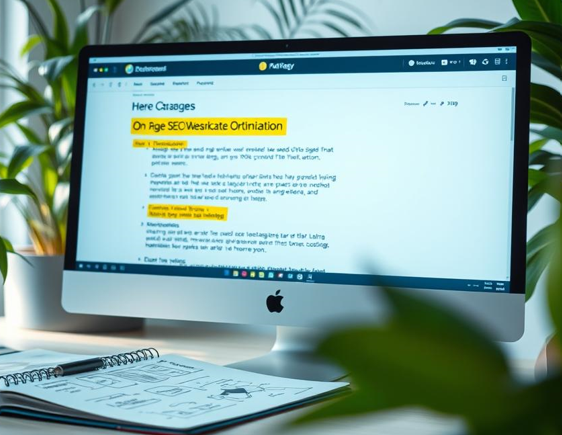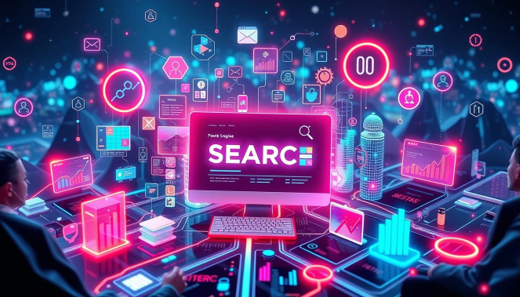Having a strong online presence is essential for any kind of business in the modern world. What is Search Engine Optimization (SEO)? It is one of the effective techniques to increase traffic to your website and increase visibility. It entails optimizing your content and website to rank better in search engine results, which will greatly facilitate finding you by your target market.
We shall delve deeply into the realm of SEO in this guide. The fundamentals, content marketing, off-page and on-page optimization, and technical SEO will all be covered. This article will equip you with the knowledge and skills necessary to increase your online presence through search engine optimization, regardless of your role as a marketer, digital strategist, or business owner.
Key Takeaways
- SEO is the practice of optimizing your website and content to improve its visibility and ranking in search engine results.
- Effective SEO involves a combination of on-page optimization, off-page strategies, and technical considerations.
- Keyword research and content optimization are crucial for on-page SEO.
- Link building and social media marketing are key off-page optimization tactics.
- Technical factors, such as website speed and mobile optimization, play a significant role in SEO.
Understanding Search Engine Optimization (SEO)
SEO is key in digital marketing. It makes your website more visible and ranked higher in search results. Knowing SEO basics helps improve your site’s performance and attract more visitors.
What is SEO?
SEO makes your website more likely to show up in search results. It uses various techniques to make your site more friendly to search engines. This includes optimizing your site and its content for specific keywords.
The Goals of SEO
The main goals of SEO are to:
- Increase your website’s visibility and discoverability in search engine results
- Improve your website’s search engine rankings for targeted keywords and phrases
- Attract more qualified, high-intent traffic to your website
- Enhance your website’s overall user experience and engagement
- Ultimately, drive more leads, sales, and conversions for your business
By aiming for these goals, you can use search engines to reach your audience. This boosts your online success.

| SEO Goal | Description |
| Increase website visibility | Improve your website’s appearance in search engine results, making it more discoverable by potential customers. |
| Improve search rankings | Optimize your website to rank higher for relevant keywords, increasing the chances of being clicked on. |
| Attract qualified traffic | Drive more high-intent, targeted visitors to your website who are likely to convert into leads or customers. |
| Enhance user experience | Improve the overall experience for visitors to your website, leading to better engagement and increased conversions. |
| Drive business growth | Achieve your ultimate goal of generating more leads, sales, and revenue for your business through effective SEO strategies. |
On-Page Optimization Techniques
The cornerstone of search engine optimization (SEO) is on-page optimization. Your website’s ranking rises as a result. Focus on content optimization, keyword research, and targeting if you want your website to become more visible.
Keyword Research and Targeting
Do extensive keyword research first. Learn what queries your target audience uses. To locate quality keywords, use resources like Ahrefs, SEMrush, and Google Keyword Planner.
Use the appropriate keywords you’ve chosen throughout your article. Include them in headings, content, meta descriptions, and page titles. When doing search engine optimization, strive for a natural feel.
Content Optimization
Creating engaging, informative, and optimized content is key. Make sure your content solves problems and answers questions. Use your target keywords wisely.
Also, make your content easy to read by using headings and paragraphs. Add alt text and captions to images. Consider videos or infographics to improve the user experience.
“Content is king, but context is God.” – Gary Vaynerchuk
Mastering on-page optimization will boost your website’s visibility. It will attract more targeted traffic. This will help you meet your content marketing and search engine algorithms goals.

Off-Page Optimization Strategies
With off-page SEO, you can improve your website’s search engine rating by taking actions outside of it. Link building and social media marketing are part of it.
Link Building
Link building gets backlinks from other sites to yours. These links show search engines your content is valuable. Good strategies include guest posting, reaching out to influencers, and using partner connections.
Social Media Marketing
Social media marketing is key in today’s digital world. It helps with off-page optimization and managing your online image. By engaging on Facebook, Twitter, and LinkedIn, you can boost your search engine rankings and website traffic. Share great content, talk to your followers, and grow your social media presence to boost your SEO.
Using smart link building and social media marketing can greatly improve your off-page optimization. This will help increase your search engine visibility.
“Effective off-page optimization is crucial for building a strong online presence and driving sustainable traffic to your website.”
What is Search Engine Optimization (SEO)?
Search engine optimization (SEO) helps websites show up better on search engine results pages (SERPs). It’s key in today’s digital marketing world. By knowing how search engines work, sites can improve their ranking.
The main goal of SEO is to get more people to visit a website without paying for ads. This is done by making the website more appealing to search engine crawlers. These crawlers index and rank web pages.
Search engines look at several things when ranking websites. These include the quality of content, website structure, targeted keywords, and backlinks and social signals. Improving these areas can boost a website’s visibility. This leads to more visitors and potential customers.
“Effective search engine optimization is not about gaming search engines – it’s about making your website better for users.” – Rand Fishkin, Co-founder of Moz
In short, search engine optimization is vital for online success. It helps websites get more visitors and reach their marketing goals. By using good SEO strategies, websites can thrive in the online world.
Technical SEO Considerations
Improving your website’s technical parts is key to better visibility and rankings. Focus on website speed and mobile optimization.
Website Speed and Performance
Websites that load fast are favored by search engines. They look at image optimization, code minification, and server times. Fixing these can boost your rankings and give users a smooth experience.
Mobile Optimization
Today, mobile-friendly sites are crucial. Search engines value responsive design and easy-to-use mobile sites. Make sure your site works well on phones and tablets to improve your search visibility.
By focusing on website speed and mobile optimization, you can greatly improve your online presence. These technical steps enhance your site’s performance and user experience. They also help you stay competitive in the changing world of search algorithms.
| Technical SEO Factor | Impact on Search Engine Performance |
| Website Speed | Faster loading times can improve search engine rankings and user experience. |
| Mobile Optimization | Responsive design and mobile-friendly features are crucial for high search engine visibility. |
| Structured Data | Properly implemented structured data can enhance the way your content is displayed in search results. |
| Site Architecture | A well-organized site structure helps search engines crawl and index your content effectively. |
“Optimizing your website’s technical aspects is the foundation for success in search engine optimization.”
Local SEO for Businesses
In today’s world, local search is key for businesses with a physical spot or service area. Local SEO helps you show up more in searches for your area. It brings in more local customers and gets more people to visit your place.
Google My Business is a big part of local SEO. It’s free and lets you control your business info on Google. You can share your address, hours, and how to reach you.
Also, listing your business in online directories and location-based search sites is important. These help search engines see your business’s value in your area. This makes you more visible in local search results.
To get better at local SEO, make content that talks to your local customers. Use keywords and talk about what your local customers need. This helps you show up in local search results.
| Local SEO Strategies | Benefits |
| Optimize Google My Business profile | Improve visibility in Google’s search and mapping services |
| List your business in online directories | Boost your authority and relevance in local search |
| Create location-specific content | Target your local audience and improve local search rankings |
Using these local SEO tips can make your business more visible online. It brings in more local customers and gets more people to visit. Local SEO is a must for any business wanting to succeed today.
Content Marketing and SEO
SEO and content marketing go hand in hand. Superior content can significantly raise the visibility and ranking of your website. We’ll examine how adding value to your content enhances your SEO approach.
Creating Engaging and Valuable Content
The secret to success is creating content that appeals to your audience. Produce engaging and informational content. By doing this, you’ll increase your ranks and retain visitors on your website for longer.
Use a variety of formats for your content marketing, such as blog articles and videos. Make sure you’ve done thorough keyword research before optimizing your content. This makes your content more in line with what people are looking for.
Adding value to your readers is the primary objective, not merely getting a higher ranking. Pay attention to user involvement and problem-solving for your audience. This will grow a devoted community in addition to improving your SEO.
Frequently Asked Questions (FAQ)
1. What is search engine optimization (SEO)?
SEO is about making your website more visible on search engines. It uses various techniques to get your site to rank higher. This makes it easier for people to find and visit your site.
2. What are the goals of SEO?
SEO aims to make your site more visible and attract more visitors. It helps your site rank better in search results. This can lead to more people visiting your site, which can help your business grow.
3. What is on-page optimization?
On-page optimization is about improving your website’s parts that you can control. This includes using the right keywords, optimizing content, and meta tags. These steps help search engines see your site as relevant and valuable.
4. What is off-page optimization?
Off-page optimization focuses on actions outside your website to boost rankings. It mainly involves getting quality backlinks and using social media. These efforts help build your site’s reputation and authority online.
5. What is the role of content marketing in SEO?
Content marketing is key to SEO today. It involves creating content that draws and keeps your audience. This not only attracts more visitors but also tells search engines your site is valuable. Good content marketing can improve your site’s ranking and drive more traffic.
6. What are the technical SEO considerations?
Technical SEO deals with the behind-the-scenes work to make your site search engine-friendly. This includes ensuring your site loads quickly, is mobile-friendly, and is easy for search engines to crawl. These technical aspects are crucial for your site’s visibility and ranking.
7. What is local SEO, and why is it important?
Local SEO helps your site show up in local search results. It’s vital for businesses with a physical location. By optimizing your Google My Business listing and creating local content, you can attract more local customers.
You might also like:
What is Email Marketing?
Types of Email Marketing
6 Elements of Marketing Email
What are the 7 steps of Email Marketing?
What are Email Marketing Tools?
Overview of AWeber – An Email Marketing Tool



